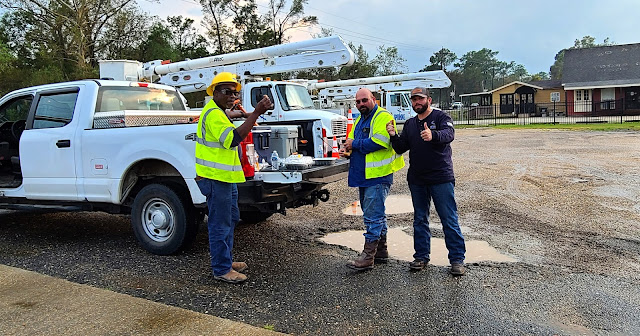USU Graduate, Army Nurse Feeds Hundreds in the Aftermath of Hurricane Ida
By Ian Neligh
Army Maj. Scott Richardson, a Louisiana native, was home on leave from his duties in Texas when Hurricane Ida hit.
The 150 mph winds effortlessly destroyed homes, toppled power lines and left thousands homeless when it made landfall on Aug. 29. Louisiana declared a state of emergency.
 |
| Army Maj. Scott Richardson at home grilling sausages to add to meals for crews restoring power after Hurricane Ida. (Photo courtesy of Army Maj. Scott Richardson) |
“I was on vacation,” says Richardson. “The hurricane just kind of blossomed up when I was on leave there. I didn’t expect for it to turn out the way that it did.”
Richardson is an Army nurse who graduated from the Uniformed Services University of the Health Sciences (USU) family nurse practitioner Doctor of Nursing Practice degree program in 2017. He is currently the Officer in Charge of the Family Practice Mendoza Clinic at William Beaumont Army Medical Center in El Paso, Texas.
Richardson says during the storm three separate families, including his own, stayed at his house because of its successful track record of withstanding hurricanes. Luckily, when the storm passed, his home was largely unscathed, although his neighbor’s roof was completely torn off.
“Where I was at it was mostly wind damage,” Richardson describes. “Trees were down, houses blew down, roofs gone, power lines down.”
An army of linemen and women, more than 25,000, traveled to Louisiana and Mississippi from across the country to help restore power to beleaguered communities.
“We were without power for seven days,” says Richardson. “We still had cell phones and I had a generator so I could kind of keep stuff running a little bit in the house.”
However, word soon spread to Richardson that the men and women restoring power to the state often faced hardships in fulfilling their mission — including going without meals.
“Some of the power line people were having problems getting fed, and they hadn’t had a meal in 24 hours.” Richardson says he felt compelled to help.
“My wife and I were like, ‘we can’t do a lot, we might as well take it upon ourselves to start cooking for these guys,’ to help them to where they could continue helping us and helping all the rest of the community get power.”
So Richardson began grilling. He cooked food from his freezer and went to the local store, which opened briefly, and bought what they had in stock. When he finished, they wrapped the food in aluminum foil and went driving until they found a crew on the side of the road and offered up the fare.
“All of them were very thankful; they were appreciative,” Richardson says.
He says they initially thought about asking the power crews to come to them for the meals but decided it would take away from their time repairing the lines.
“They didn’t have time to take a break and come to us to get the food or the water, so that’s why we decided to deliver,” Richardson says.
Soon some of their friends began to help with the cooking, and he took on the duty of transporting the breakfast, lunch, and dinners.
“Our radius got bigger and bigger… and eventually it just became this six- or eight-hour ordeal where we’re delivering food to hundreds of people,” Richardson says. “We would just drive around in bigger and bigger circles delivering food.”
Eventually, they worked out a plan to just call the supervisor to ask where the crews were located each day so they could bring the meals directly to them.
Soon people began donating money to help buy groceries for the food being prepared; they collected as much as $2,100. Richardson says people were happy to help or chip in because they knew the importance of getting the electricity back on.
The power was finally restored, but he and his family weren’t yet done offering a helping hand. In an effort spearheaded by his 19-year-old son, they told the crews to drop off their laundry at their house.
“And 10-15 linemen’s bags would show up every morning on one of their trucks, or their foremen would show up with bags, and my son took it upon himself to wash, dry, fold, and put it back in the bags with labels,” Richardson says.
Richardson is quick to credit the generosity of those who donated grocery money or who chipped in to cook meals to help make the effort successful. He says while it wasn’t the most relaxing way to spend his time off, it was something he would do again.
“They came in from other states to help us and we found out that they were going without food or even water in some places — they’re helping us. We need to help them,” he says. “That’s just the Cajun way…. It’s just what we do in Louisiana. We help each other out.”






